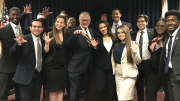Mariantonia Mejia | Staff Writer
FIU’s Disabled Student Union (not to be confused with the Disability Resource Center), is the newest official bureau to be recognized within our Student Government Association.
The decision, which was made on Nov. 27 during a senate meeting, gives the DSU access to SGA funds in the new fiscal year, which starts next summer.
This is a huge step toward fixing the many issues, such as inaccessible classrooms, that disabled students face at FIU that cannot be solved through the already underfunded DRC.
Kaily LaChapelle, co-founder and vice-president of the DSU, president of the Pride Student Union as well as Senate president of the SGA, believes that much of the problem is the over-reliance on the DRC when they are “understaffed, under-resourced, and underfunded.”
“I was very shocked when I found out how much is on students to individually sign up for accommodations and the overall individualist methodology behind how FIU looks at accessibility,” says LaChapelle.
I myself, as an able-bodied student, experienced the threat of negative effects to my grade in classes where I was forced to be absent due to un-reschedualable psychiatric appointments.
I was told that it was my responsibility to speak with the DRC, or I may have to drop the theatre class.
The inclusion within SGA allows for disabled students to more accurately be represented by their peers. This will hopefully lead to more being done to make our disabled students feel as welcome at FIU as their able bodied classmates.
Not only this, but disabled professors at FIU should also be given the basic respect of having proper accommodations at their workplace, something DSU hopes to aid throughout both MMC and BBC campuses.
At the end of the Fall 2022 semester SGA passed the “Panthers with Disabilities” act, sponsored by Lachapelle, containing a plethora of research on the inaccesibility on campus.
“Campus infrastructure (crosswalks, elevators, classrooms) and transportation lacks immensely still for the disabled community,” says LaChapelle. “The pharmacy on campus was shut down in 2021, which deeply affected many students living on campus.”
Personally, I know that the speed (or lack thereof) and constant malfunctioning that afflicts not only our parking garage, but all elevators is particularly frustrating to me as someone who simply suffers from asthma and all around laziness.
If something that is only a mere inconvenience for me is enough to ruin my entire day, I cannot imagine the rage and exhaustion that our disabled students must experience every day when facing these roadblocks to learning.
“Accessibility is not just a disability issue,” says DSU president & SGA Senator, Hua Hui Vogel. “Rather, a collective issue as accessibility benefits everyone!”
As is, the US is a difficult landscape for disabled people to navigate. Disabled workers historically earn less than able-bodied employees.
Disabled Americans are also uniquely vulnerable to the spread of COVID-19 and other easily spreading viruses, which is compounded by the fact that Americans with disabilities are subject to inadequate healthcare, or struggle to have access to it at all.
Keeping these issues in mind, it is incredibly unfair that we have been unable to create a space on campus that serves at least as temporary respite for disabled students.
They are likely experiencing the same, if not additional, problems that they are subject to outside of our campus. As a respected university, we have to be better than that.
While I do believe this addition to be a great sign of progress, there is still a way to go in terms of modernizing the accommodations provided for our disabled population.
The Americans with Disabilities Act (ADA), which was signed into law in 1990, is considered by many disability activists to be outdated, with an abundance of unaddressed concerns like marital or parental rights, among many others.
At a university of over 55,000 people, we have one singular ADA and Accesibility Coordinator, and there is no accessible way to report ADA complaints at all.
While FIU’s DSU is not going to magically create a perfectly accessible campus for disabled students, the concerted effort to become an officially recognized bureau of the SGA will be greatly beneficial in giving a voice to students that have for so long remained voiceless.
LaChapelle states that DSU plans on creating an accessible event guide as well as a stronger system to track ADA complaints on campus.
I urge you to keep an eye on the DSU for inclusive events as well as future initiatives such as these to make FIU more accessible.
It is the responsibility of the able bodied population at FIU to do what they can to advocate for and listen to disabled students, because, as always, there is power in numbers.






Be the first to comment on "SGA’s inclusion of the Disabled Student Union is only the first step"